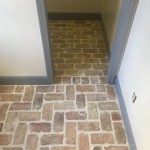Vinyl Tile on Concrete Basement Floor: A Comprehensive Guide
Transforming your concrete basement floor into an elegant and functional space is now possible with vinyl tile. Vinyl tiles offer a range of benefits, including durability, water resistance, and affordability, making them an ideal choice for basement flooring.
Benefits of Vinyl Tile for Basement Floors
Durability: Vinyl tiles are highly durable, able to withstand heavy foot traffic and moisture. They are resistant to scratches, dents, and tearing, ensuring they will maintain their appearance for years to come.
Water Resistance: Vinyl tiles are 100% waterproof, making them an excellent option for basements prone to moisture or occasional flooding. Unlike other flooring materials, vinyl will not warp, buckle, or deteriorate when exposed to water.
Affordability: Vinyl tiles are a budget-friendly flooring option compared to other materials such as hardwood or tile. They offer a high-end look without breaking the bank.
Choosing the Right Vinyl Tile for Your Basement
Selecting the right vinyl tile for your basement depends on specific needs and preferences. Consider the following factors:
Type: There are two main types of vinyl tiles for basements: peel-and-stick and click-lock. Peel-and-stick tiles are self-adhesive, while click-lock tiles interlock for a secure hold.
Backing: Vinyl tiles come with different backings. Choose tiles with a closed-cell foam backing for added cushion and sound absorption.
Thickness: Vinyl tiles range in thickness from 2mm to 5mm. Thicker tiles are more durable, while thinner tiles are easier to install.
Installing Vinyl Tiles on Concrete Basement Floor
Installing vinyl tiles on a concrete basement floor is a DIY-friendly project with the right preparation and tools.
Preparation: Clean the concrete floor thoroughly and ensure it is level and free of cracks or moisture.
Underlayment: Install an underlayment layer to provide moisture protection, soundproofing, and a level surface.
Adhesive: For peel-and-stick tiles, apply adhesive to the back of each tile. For click-lock tiles, the adhesive is already applied.
Installation: Start installing the vinyl tiles from the center of the room, working your way out. Press each tile firmly into place and interlock them for click-lock tiles.
Maintaining Vinyl Tiles
Maintaining vinyl tiles is effortless. Simply sweep, vacuum, or mop with a damp cloth. Avoid using harsh cleaners or abrasive materials, as they can damage the tiles.
Conclusion
Installing vinyl tile on your concrete basement floor is a practical and affordable way to upgrade your space. The durability, water resistance, and easy maintenance make vinyl tiles the perfect choice for any basement. Whether you're looking to create a cozy and inviting area or a functional and stylish workspace, vinyl tiles offer a wide range of options to suit your needs.

Vinyl Plank Flooring On Concrete Basement Pros Cons

Vinyl Plank Flooring On Concrete Basement Pros Cons

Tips For Installing Vinyl Plank Over Concrete Floors Lemon Thistle

How To Install L And Stick Tiles For Basement Flooring The Home

Installing Vinyl Floor Tile On Cement Garage Basement

How To Install Luxury Vinyl Tile Over Concrete Floors Noting Grace

6 Inspiring Ideas For Basement Flooring In Portland

How To Install L And Stick Tiles For Basement Flooring The Home

Vinyl Plank Flooring On Concrete Basement Pros Cons

How To Install Vinyl Plank Flooring On Concrete Step By Guide
See Also







